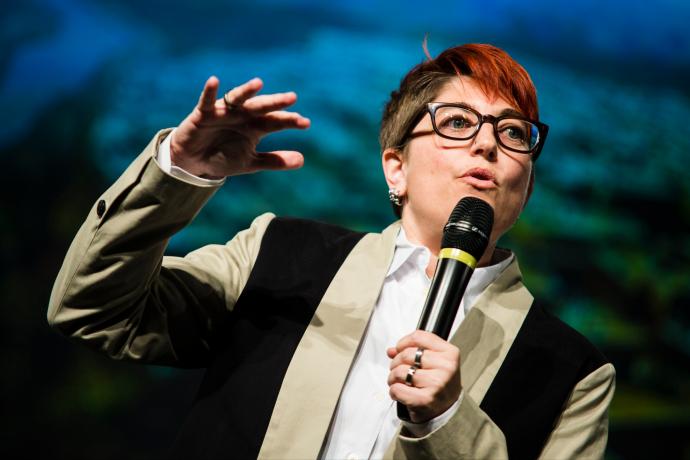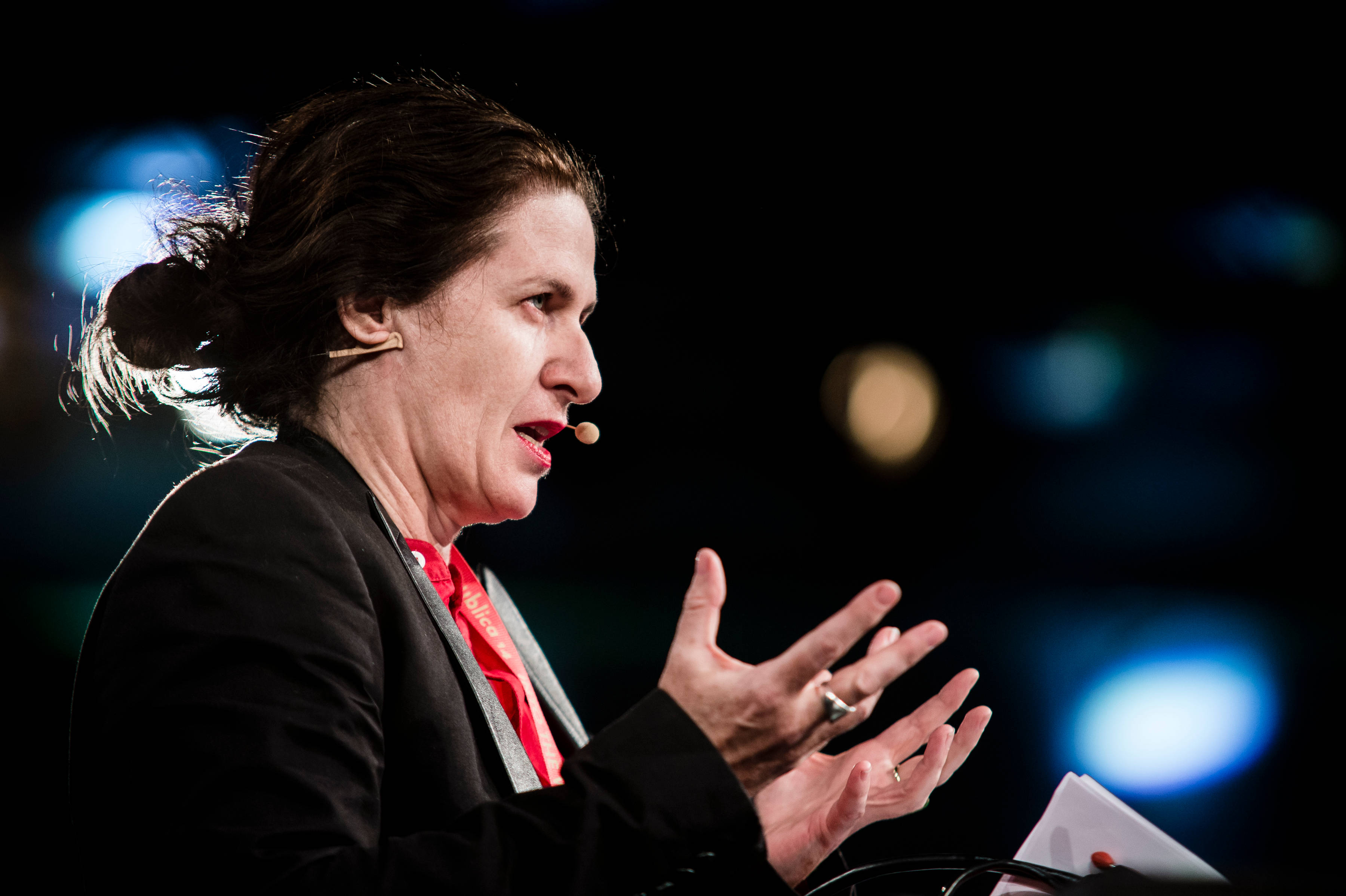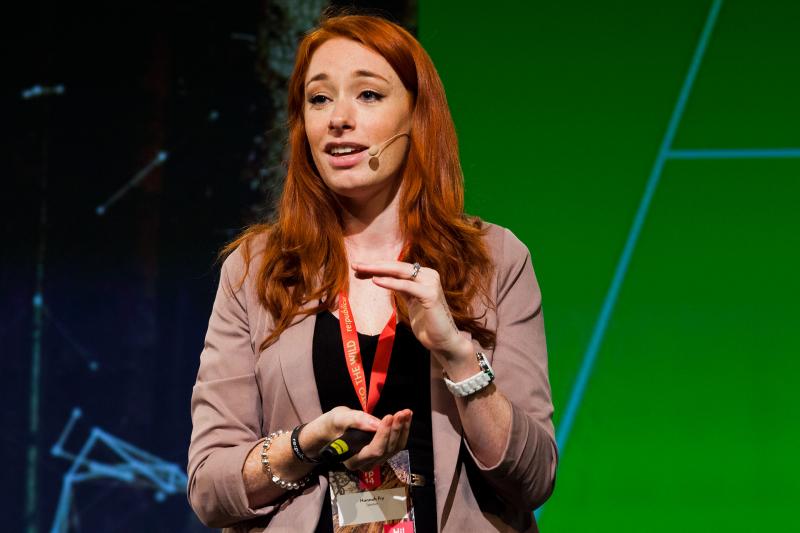annalee_newitz.jpg

Hosted under the title science:lab, re:publica 2014 and the Bundesministerium für Bildung und Forschung’s sponsored Wissenschaftsjahr 2014 – Die digitale Gesellschaft organised a sub conference on open science as well as a Science Hack Day. Following our report on the Hack Day, today we are looking back at our “Open Science” track.
The sub conference was opened by the US science journalist, author and the Editor-in-Chief of the io9 science and sci-fi blog Annalee Newitz, who prognosticated that humankind would only survive the next apocalypse by learning from past disasters. Newitz, her passion for science evident, offered her audience 60 minutes of knowledge and entertainment.
The sub conference’s speaker list also included the design researcher Gesche Joost, Internet Archive’s Alexis Rossi, Delia Browne from the Peer-to-Peer University, the British mathematician Hannah Fry and many more.
One of Hannah Fry’s research topics are the London riots of 2011. She analysed the heavy rioting, which shook the UK’s capitol, and came to re:publica to explain how one could use mathematics to predict arising conflicts. Astonishingly, the same mathematical models are used by Pep Guardiola in football strategy.

Another conference highlight: the keynote of Delia Browne. The Australia-based co-founder and president of the Peer-to-Peer University (P2PU) campaigns for a reform of the copyright laws and, as National Copyright Director, fights for Open Education and Open Access – free and available access to knowledge and its producers. At #rp14 she talked about outdated copyright and education standards and presented several current P2PU projects as possible viable alternatives.
Who is archiving the Internet? That was the leading question in the discussion between Elisabeth Niggemann (Director General of the German National Library),Paul Klimpel (Coordinator for Cultural Heritage with the Internet & Gesellschaft Collaboratory e.V.) and Alexis Rossi (Director of Web services – Internet Archive).Inherent in the medium is a degree of fleetingness, which can be detrimental to scientists. Images or web pages, which have been used as sources, are suddenly gone. The Archive keeps a copy of the Internet “as it once was”, which, just as in a library, can be viewed in its previous states.
To build bridges between technological innovations and the daily needs of people in the physical world – that is the task of design researchers, such as Gesche Joost. She is a professor at the Universität der Künste (UdK) in Berlin and, since March 2014, the “Internet ambassador” to the German federal government. In her talk at #rp14 she discussed how the lack of understanding and reservations often faced by new technological breakthroughs could be addressed and overcome.
Documentation
Here you can find all science:lab sessions and a playlist of all science:lab videos.

Press reviews
Of course, we weren’t the only ones to be excited about the many science orientated sessions. Here we’ve put together several pieces of press coverage of our Open Science sub conference at re:publica:
“Whether shopping or looting – just get close to the action – At re:publica, Hanna Fry explains how the behaviour of hooligans can be calculated in advance. Fluid dynamics not only describe the behaviour of liquids but also that of demonstrators.”
Neues Deutschland, 14.5.2014
TwitterBuzz around ScienceSlam
“One of this year’s focal points is the issue of open science. The corresponding sub-conference Science:Lab will be opened by the American sci-fi author Annalee Newitz. The programme also includes several of the best German science slammers.”
CRN.de, 6.5.2014
“A 'Science Slam' is taking place in the next room down. This event features a line-up of speakers from all scientific disciplines, who take turns in briefly presenting current research projects. In the end it is the more amusing, rather than the most cogent, presentation that is crowned the winner.”
FAZ.net, 8.5.2014
“Even events on non-politicised topics turn into political manifestations. Gesche Joost’s half-hour talk on re:publica’s main stage included. Her »science:lab« branded talk »Designforschung für eine vernetzte Gesellschaft« begins with an opening questions: »My data: is this term still relevant?« Her demands: »We have to become more political.«”
Börsenblatt, 9.5.2014
“In the autumn of 2013 and together with three other young historians, Jahnz and Hoffmann used Twitter to recount the events surrounding the Reichspogromnacht. Each of the more than 700 tweets were supported by a source on the project’s blog. They were expecting up to 500 followers, Hoffmann recounts from the re:publica stage. They were overwhelmed when the eventual number of followers exceeded 10,000. The two explained the week-long preparations, their work procedures, why they opted for the Twitter medium and reveal: the most widely spread @9Nov38 tweet was the one from 11 November at 11:11 – ‘in midst of the carnival’.”
Berliner Zeitung, 6.5.2014
“Education should not be a means to an end. Instead, it should be spread in an interesting way and implement current digital means. Currently, there are not enough places, access or material for life-long learning for all people. Trained in law, Delia Browne is the co-founder of the Peer to Peer University, which she presented at re:publica. Its foundations are in open online communities, which are supposed to enable creative, open and collaborative learning.”
UdL Digital, 6.5.2014
“The international space station is just fancy camping – we need to go to Mars! No doubt about it, especially not after the 25 minutes in which Rin Räuber lets us in on her fascination with Mars. She covers past missions and how Nasa currently envisions such a voyage. 53 years ago, Kennedy promised that man would soon walk on the moon – today, Rin Räuber encourages us to spread the word about a trip to the red planet. Done.”
olereissmann.de, 11.5.2014
“’Should be really be leaving it up to the security services to archive the Internet?’ Of course not, is the mutual answer of the two speakers on stage: Alexis Rossi from the San Francisco-based Internet Archive, the world’s largest facility for archiving digital data, and Elisabeth Niggemann, Director General of the German National Library in Frankfurt.”
WDR, 8.5.2014
“These days, when one thinks about the collection and storage of data in net one invariably connects this topic to the NSA. In contrast, the archiving of content for future use by society can be of tremendous use. At re:publica, we talked to Alexis Rossi from the US-based Internet Archive. With her help, we even managed to find that our Zündfunk homepage from 1997 was still online.”
Bayern2, 8.5.2014
 Das Wissenschaftsjahr 2014 – Die digitale Gesellschaft
Das Wissenschaftsjahr 2014 – Die digitale Gesellschaft
The digital society is a society in change. Digital technologies permeate our daily lives and offer a variety of new possibilities. The Year of Science 2014 – the digital society shows how science and research drives these developments and dedicates itself to the outcomes of the digital revolution.
www.digital-ist.de
Photos: cc-by-sa re:publica/Gregor Fischer

